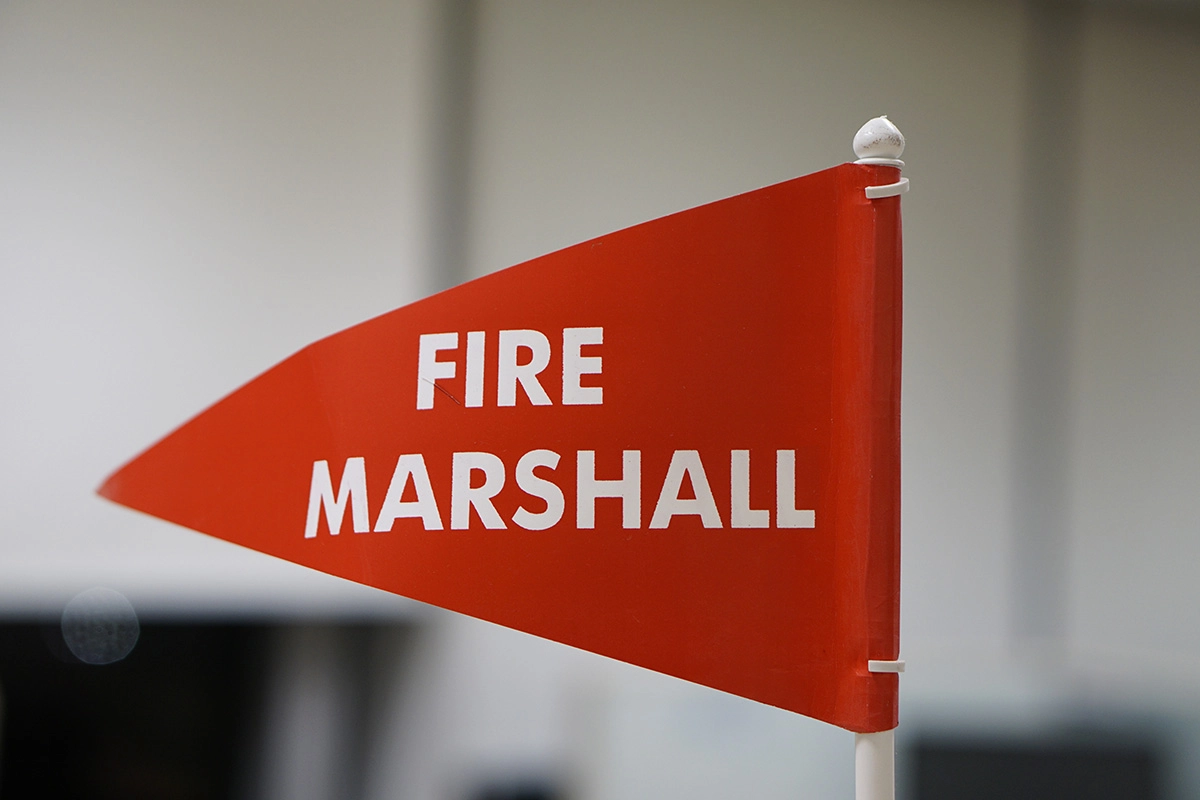What is a Fire Marshalls responsibility?
A Fire Marshall is a safety official responsible for enforcing fire safety regulations and preventing fire hazards in a workplace. Fire marshalls play a critical role in safeguarding lives and property. They are the backbone of any fire safety programme, responsible for both preventing fires and ensuring safe evacuations in case of an emergency. But what exactly does a fire marshall do? A Fire Marshalls responsibility is extensive, encompassing proactive measures, emergency response, and public education. Let’s look into the multifaceted responsibilities of a fire marshall.
Prevention: The Cornerstone of Fire Safety
A fire marshall’s primary goal isn’t firefighting; it’s preventing fires from happening in the first place. This proactive approach involves:
- Risk Assessments: Fire marshalls conduct regular inspections of buildings and premises to identify potential fire hazards. This includes examining electrical wiring, flammable materials storage, and proper use of appliances.
- Hazard Elimination: Once a fire hazard is identified, the fire marshall reports it and ensures its proper mitigation. This might involve requesting repairs, relocating flammable materials, or implementing stricter safety procedures.
- Fire Safety Training: Fire marshalls educate occupants on fire safety protocols. This includes training on using fire extinguishers, recognising fire hazards, and understanding evacuation procedures. They may also conduct fire drills to ensure everyone is familiar with the evacuation plan.
- Maintenance and Upkeep: Fire marshalls play a crucial role in ensuring fire safety equipment is functional. This involves regular inspections of fire alarms, fire extinguishers, emergency lighting, and fire doors. They may also oversee maintenance schedules and report any malfunctions.
Emergency Response: Leading the Way in Crisis
When a fire breaks out, a fire marshall’s actions become even more crucial. They are responsible for:
- Raising the Alarm: Upon detecting a fire, the fire marshal activates the fire alarm system, alerting occupants and calling the fire department.
- Evacuation Management: The fire marshall plays a vital role in directing a safe and orderly evacuation. This involves ensuring all exits are clear, guiding occupants to the designated meeting point, and assisting those who might need help evacuating, such as people with disabilities.
- Fire Containment (if safe): In some instances, a fire marshall may attempt to extinguish a small fire using a fire extinguisher. However, it’s important to remember that personal safety is paramount. They should only attempt this if they are properly trained and the fire is contained to a very small area.
- Maintaining Order and Communication: Fire marshalls maintain order at the evacuation scene, preventing panic and ensuring everyone remains calm. They may also need to communicate with arriving firefighters, providing information about the fire location, building layout, and potential hazards.
Beyond the Building: Public Education and Community Outreach
A fire marshall’s responsibility extends beyond the confines of a specific building. They often play a role in public education and community outreach initiatives. This might involve:
- Public Education Programmes: Fire marshals may participate in educational programmes for community members, teaching them about fire safety practices, fire prevention tips, and proper use of fire extinguishers.
- Fire Safety Awareness Campaigns: They can collaborate with local authorities to organise fire safety awareness campaigns, distributing informational materials and promoting fire prevention measures.
- Working with Schools and Businesses: Fire marshalls can work with schools and businesses to develop and implement fire safety plans. They may also conduct fire safety training sessions for employees or students.
The Qualities of an Effective Fire Marshall
Being a fire marshall requires a unique skillset. Here are some of the essential qualities:
- Leadership: Fire marshalls need strong leadership skills to keep people calm and ensure they follow instructions during an emergency.
- Communication: Clear and concise communication is vital for effectively directing occupants during an evacuation and collaborating with firefighters.
- Organisation: Fire marshalls must be organised to conduct regular inspections, maintain records, and schedule fire drills.
- Problem-Solving: They need good problem-solving skills to identify and address fire hazards, and make quick decisions during emergencies.
- Physical Fitness: Fire marshalls may need to be physically fit to assist with evacuation and potentially use a fire extinguisher.
- Fire Safety Knowledge: Having a strong understanding of fire codes, fire prevention techniques, and the use of fire safety equipment is essential.
The Importance of Fire Marshals in Today’s World
In our increasingly complex and interconnected world, fire safety remains a top priority. Fire marshalls play a critical role in safeguarding lives and property by preventing fires, ensuring safe evacuations, and promoting public education.
By assuming a proactive approach and fostering a culture of fire safety awareness, fire marshalls contribute significantly to a safer and more fire-resilient future for our communities.
For more information on A Fire Marshalls responsibility contact Total Safe UK.

